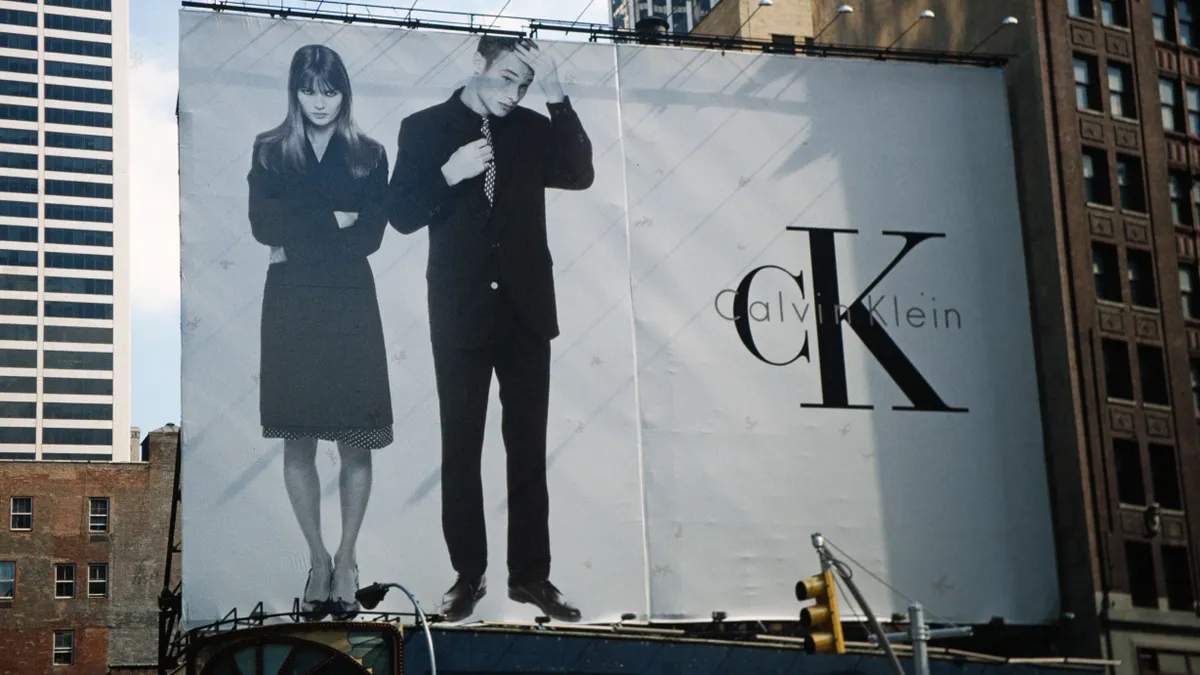Dive Brief:
-
After less than two years at PVH, Trish Donnelly is leaving “to pursue other opportunities,” remaining as an advisor through Nov. 30, per a press release Tuesday. PVH is splitting her duties as CEO of PVH Americas & Calvin Klein Global into two positions and is looking for her replacements now.
-
Donnelly isn’t the only one leaving. The company is also cutting 10% of its global workforce by the end of next year, Chief Financial Officer Zac Coughlin said in a statement released separately on Tuesday. The layoffs will net annual savings of over $100 million, the company said.
-
The moves come as the conglomerate lowered its outlook for the year, amid Q2 sales and profit declines. Revenue fell 8% year over year to $2.1 billion, with wholesale down 11%, Tommy Hilfiger down 5%, Calvin Klein down 1% and Heritage Brands down 44%. Gross margin contracted slightly to 57.2% from 57.7% last year and inventory rose 19%. Net income fell 36.6% to $115.3 million.
Dive Insight:
PVH beat many analysts’ expectations on profits in the second quarter, which Wells Fargo analysts attributed to its tight grip on expenses. Now the company is tightening its belt further.
“A critical element of our PVH+ Plan is to increase productivity and invest to grow,” Coughlin said. “We are leaning into this work by streamlining our organization, implementing new ways of working and leveraging our scale.”
While Wells Fargo analysts led by Ike Boruchow hailed the cost restructuring announced Tuesday, they noted some challenges beyond PVH’s control.
“Bigger picture, after PVH appeared to be engineering a soft landing 90 days ago, today's print highlights a worsening consumer backdrop, particularly for the apparel category,” Boruchow said. “Inventory growth ticked up in 2Q (after being well controlled in 1Q) with promo headwinds likely mounting, while in [North America] profitability for both brands remains well below pre-pandemic levels.”
On a call with analysts Wednesday morning, PVH executives acknowledged macro obstacles, above all weaker consumer demand due to inflationary pressures both here and in Europe. But they emphasized the company’s strengths and said their “PVH+ Plan” remains largely in place. That five-year strategy is focused on Calvin Klein and Tommy Hilfiger and depends on digital sales growth — through the company’s own sites and those of their retail partners — and on company-run physical stores. Direct-to-consumer sales (from both brand sites and stores) in Q2 fell 5% year over year, including a 3% reduction from its exit of the Heritage Brands retail business.
They were unfazed by the quarter’s 7% decline in e-commerce, which includes PVH and third-party online sales.
“What's important to mention is that this year's performance will reflect consumers coming back to brick-and-mortar shopping in most regions after a multiyear absence, including lockdowns during the height of COVID,” CEO Stefan Larsson said on the call. “However, we still expect that the digital channel has the strongest long term trajectory of growth over the coming years, across both owned-and-operated and third party e-commerce channels, and digital continues to represent approximately 25% of our revenue.”
PVH now expects its 2022 revenues to decline 4% to 3% year over year, (which factors in negative impacts from its scale-down of its Heritage Brands business and the impact of the war in Ukraine), and for operating margin to reach about 9%. That’s down from its previous guidance for a 2% to 3% revenue increase and operating margin of 10%. But stripping out currency headwinds and revenue losses from the exits from Russia and Heritage, the revenue estimate is closer to an increase of 7% to 8%, according to math from Credit Suisse analyst Michael Binetti.
Donnelly’s exit after just a year and a half, weakness emerging from Tommy Hilfiger compared to rivals like Ralph Lauren and profit pressures in North America are among red flags cited by Credit Suisse, though Binetti joins other analysts in seeing the potential for the conglomerate to rebound.
“We think PVH has the brand strength and balance sheet to recover from the impacts of COVID-19 and well exceed FY19 EBIT margin levels in the coming years,” UBS analysts led by Jay Sole said in emailed comments.















